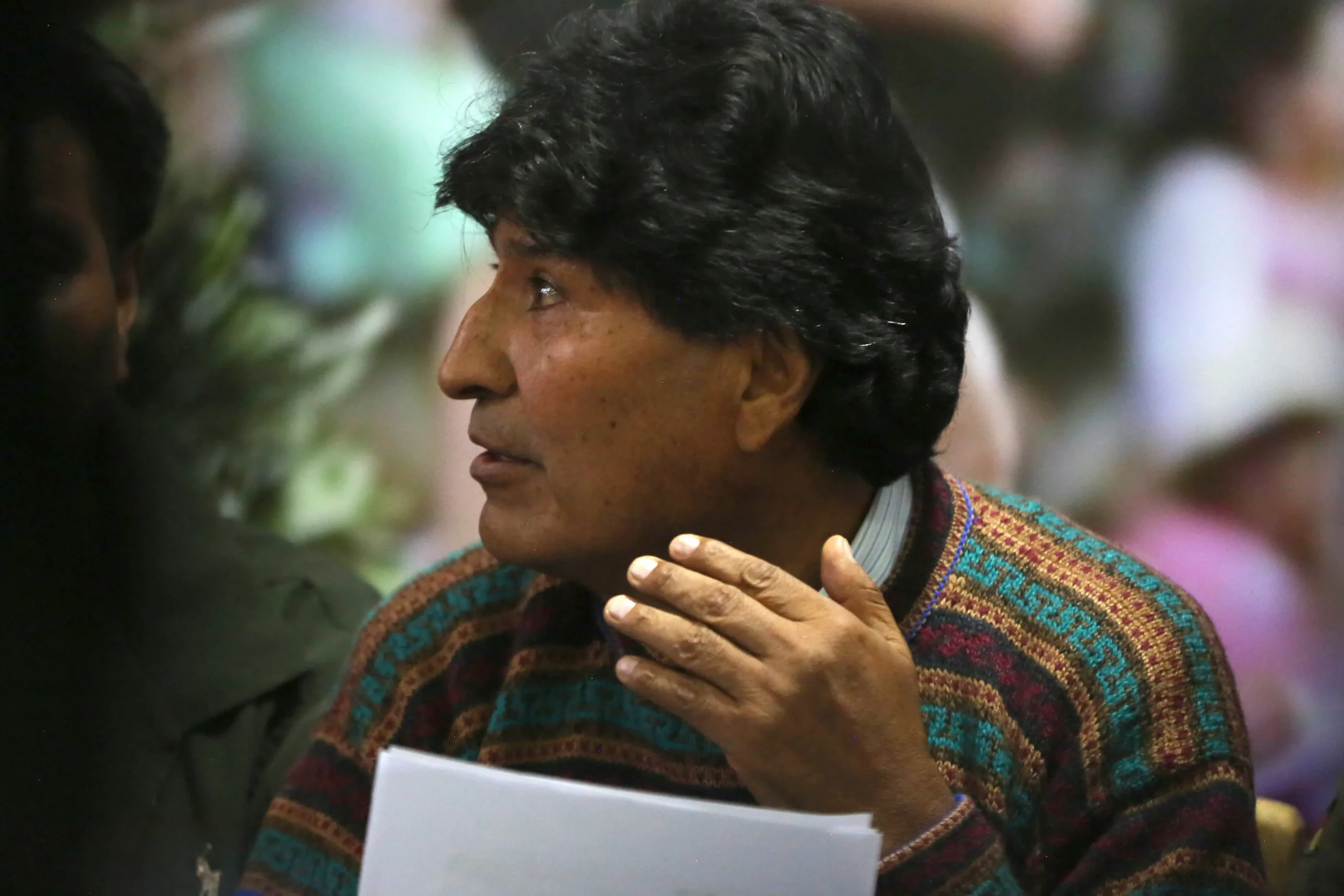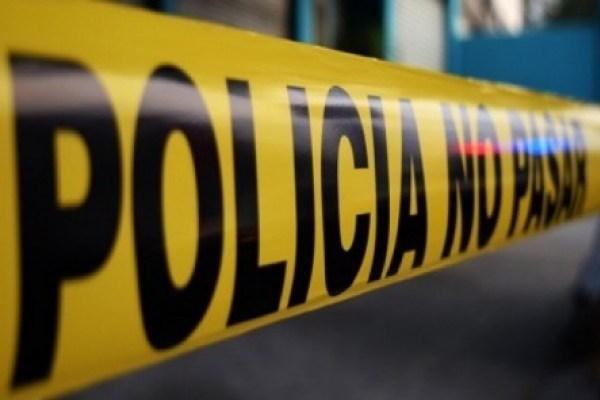International
Evo Morales assures that he is “the first electoral option” in Bolivia despite disqualification

The former president of Bolivia Evo Morales, between 2006 and 2019, said this Saturday that he is still “the first option” with a view to the general elections of 2025, despite the fact that he is not qualified to run again.
Morales thus reacted to a vote intention survey commissioned and disseminated by businessman Marcelo Claure that shows the former leader of the governmental Movement to Socialism (MAS) tied in first place with the opposition Manfred Reyes Villa, current mayor of the central city of Cochabamba.
“This is the reason why they try to steal the acronym, chase us with about twenty trials, try to disqualify us and try to kill us. We are first in all polls,” Morales said in X.
Evo Morales: “we are the first choice of the people”
“Despite the fact that they always minimize our support in the popular sectors and in the countryside, we are the first choice of the people to save Bolivia,” added the politician, who is distant from the Government of Luis Arce.
He also assured that he will continue to “fight to prevent” Bolivia from “continuing and falling into the hands of those who want to destroy it.”
The survey released by Claure was conducted by the company Panterra from November 2 to 15, with face-to-face interviews with people over 18 years of age in Bolivia and a margin of error of 2.2%.
Among other results, the consultation shows that Morales and Reyes Villa are tied with 18%, followed by the opposition businessman Samuel Doria Medina with 13%, and there are also 21% of respondents who do not know who they are going to vote for.
“Trusted information”
Claure indicated in X that she commissioned the survey to “provide Bolivians with reliable information to understand the political environment and make informed decisions” and justified Morales’ inclusion that “in Bolivia everything can change and nothing is certain.”
The Constitution and the law of Bolivia establish that to win in the first round you must obtain 50% plus one of the votes, or at least 40% with an advantage of ten percentage points over the second most voted.
The Magna Carta also allows only two presidential periods, but Morales was able to run for the 2014 elections in search of a third term and in 2019 in pursuit of the fourth with the endorsement of the Plurinational Constitutional Court (TCP).
Morales and his lawyers insist that he is qualified to run again in 2025, but the Government assures that it is not basing it on an advisory opinion of the Inter-American Court of Human Rights (CorteIDH) on indefinite re-election, a ruling of the Bolivian TCP issued in 2023 and the Constitution itself.
Sentence against Evo Morales
Two TCP magistrates recently issued a sentence indicating that the elected authorities in the Legislative, Executive and Judicial branches can only exercise for two periods, continuous or discontinuous, which affects Morales’ intentions to be a candidate again.
The same magistrates also endorsed a congress held by the MAS faction related to the Arce Government that elected the peasant leader Grover García as the new president of the party, stripping Morales of the official leadership after almost three decades.
Morales considers the resolutions of the TCP null and void because the current magistrates extended his mandate and that of the judges of other high courts of Bolivia, which was supposed to end at the beginning of 2024, in the absence of the judicial elections that could not be held in 2023.
Arce and Morales have been distanced since the end of 2021 due to differences in the state administration, the need to renew the direction of the MAS and the definition of the candidacy of the ruling party for 2025.
International
Football Fan Killed in Clashes After Colombian League Match

Fans of Cúcuta Deportivo and their traditional rivals Atlético Bucaramanga clashed outside the stadium following their local league match on Tuesday, leaving one supporter dead and several others injured.
The deceased fan was stabbed, according to a senior police official in Cúcuta who confirmed the cause of death in a video statement. Local media reported that the victim was a supporter of the visiting team, Atlético Bucaramanga.
The match ended in a 2-2 draw. Authorities had banned the entry of Atlético Bucaramanga’s organized supporters into the stadium in an effort to prevent disturbances.
Despite the restrictions, violence broke out in the surrounding areas after the game. Among the injured were three police officers, an institutional source told AFP.
The incident adds to a series of recent violent episodes linked to Colombian football. The most recent occurred in December, when supporters of Atlético Nacional and Independiente Medellín clashed in the stands and on the pitch, leaving 59 people injured.
International
Missing Spanish Sailor Rescued After 11 Days Adrift in Mediterranean

The man had departed from the port of Gandía, on Spain’s eastern coast, with the intention of reaching the southern Spanish town of Guardamar del Segura, a journey of about 150 kilometers, a spokesperson for Spain’s maritime rescue service told AFP.
Search boats and aircraft were deployed on January 17, but the operation was called off on January 22 after efforts proved unsuccessful. Alerts were then issued to vessels navigating the area in case they spotted any signs of the missing sailor.
As hopes were fading, a surveillance aircraft from the European Union’s border agency Frontex spotted the sailboat on Tuesday, along with a person signaling for help, approximately 53 nautical miles northeast of Bejaia, Algeria.
A nearby vessel, the Singapore-flagged bulk carrier Thor Confidence, carried out the rescue and is expected to bring the man to an end to his ordeal when it arrives on Thursday in the southern Spanish port city of Algeciras.
Maritime rescue services shared images on social media showing a small white sailboat drifting at sea and secured alongside the much larger ship.
It remains unclear how the sailboat ended up hundreds of kilometers off its intended route or how the man managed to survive for so long alone in open waters.
International
Rubio Says U.S. Could Participate in Follow-Up Russia-Ukraine Talks

The United States could join a new round of talks this week aimed at ending Russia’s invasion of Ukraine, Secretary of State Marco Rubio said on Tuesday.
Teams from Kyiv and Moscow met last Friday and Saturday in Abu Dhabi in their first publicly acknowledged direct negotiations to discuss the peace initiative promoted by former U.S. President Donald Trump.
“They are going to hold follow-up talks again this week,” Rubio told the Senate Foreign Relations Committee. “There could be U.S. participation.”
However, Rubio suggested that Washington’s role may be more limited than during last week’s discussions, which included Steve Witkoff, the president’s special envoy, and Jared Kushner, Trump’s son-in-law.
The secretary of state indicated that progress may have already been made on security guarantees for Ukraine, one of Kyiv’s key demands in any agreement with Moscow after nearly four years of Russian invasion.
“There is one remaining issue that everyone is familiar with, and that is the territorial claim over Donetsk,” Rubio said, referring to the eastern Ukrainian region that Russia wants Ukraine to cede.
“I know that active efforts are underway to see whether the positions of both sides on this issue can be reconciled. It remains a bridge we have not yet crossed,” he added during the hearing.
Rubio acknowledged that the territorial question would be particularly difficult for Ukraine to resolve.
-

 Central America2 days ago
Central America2 days agoGuatemala seizes over a ton of cocaine hidden in flour at Pacific port
-

 International4 days ago
International4 days agoTrump-Era Defense Plan Prioritizes Border Security and Scales Back Global Commitments
-

 International4 days ago
International4 days agoBogotá and Quito Seek Dialogue After Tariffs and Power Cut Escalate Tensions
-

 International3 days ago
International3 days agoDelcy Rodríguez seeks political agreements after Maduro’s ouster
-

 International2 days ago
International2 days agoSpain’s irregular migrant population rises to 840,000, study finds
-

 International2 days ago
International2 days agoHistoric snowstorm paralyzes Toronto after 60 centimeters of snow
-

 International3 days ago
International3 days agoFederal immigration agents kill man in Minneapolis, sparking protests and outrage
-

 Central America1 day ago
Central America1 day agoGuatemala Police Arrest Prison Guard Caught in the Act of Extortion
-

 Central America1 day ago
Central America1 day agoHonduras swears in conservative president Asfura after disputed election
-

 Central America1 day ago
Central America1 day agoBukele leads public trust rankings as UCA survey highlights gains in security
-

 International1 day ago
International1 day agoDoomsday clock moves to 85 seconds before midnight amid rising global risks
-

 International1 day ago
International1 day agoWinter Storm Fern Leaves 30 Dead and Over One Million Without Power Across the U.S.
-

 Sin categoría1 day ago
Sin categoría1 day agoEight Killed in Series of Armed Attacks in Ecuador’s Manabí Province
-

 International2 days ago
International2 days agoRights group says nearly 6,000 killed in Iran protest crackdown
-

 International1 day ago
International1 day agoSpain approves plan to regularize up to 500,000 migrants in Historic Shift
-

 International2 days ago
International2 days agoVenezuela frees at least 80 political prisoners, NGO says
-

 Sin categoría1 day ago
Sin categoría1 day agoEl Salvador Launches Fourth Year of Ocean Mission to Protect Marine Ecosystems
-

 International2 days ago
International2 days agoEU launches new probe into X over AI-generated fake nude images
-

 International2 hours ago
International2 hours agoMissing Spanish Sailor Rescued After 11 Days Adrift in Mediterranean
-

 International2 days ago
International2 days agoSevere winter storm grips U.S., leaves multiple dead as extreme cold persists
-

 International2 days ago
International2 days agoFrance debates ban on social media for children under 15
-

 International2 hours ago
International2 hours agoRubio Says U.S. Could Participate in Follow-Up Russia-Ukraine Talks
-

 International2 hours ago
International2 hours agoFootball Fan Killed in Clashes After Colombian League Match
-

 Central America2 hours ago
Central America2 hours agoGuatemala President Says Starlink Terminal Found Inside Prison


























